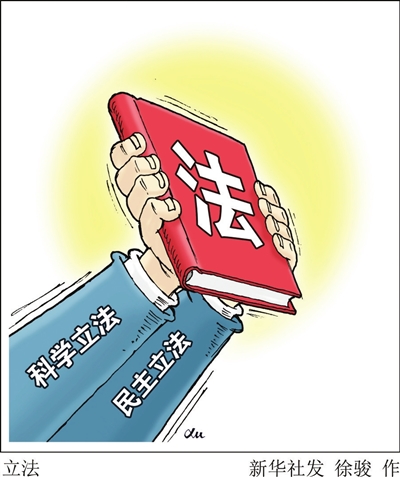

 |
| (Photo/Xinhua) |
BEIJING, July 28 -- Expanding legislative discretion of local authorities is crucial to deepening reform, a Peking University professor was quoted by Tuesday's People's Daily overseas edition as saying.
Jiang Ming'an, from Peking University, told the newspaper that a lot of issues concerning city management, such as municipal construction, protection of local culture and historical relics, need to be addressed by legislation.
Jiang made the remarks against the backdrop that several localities have set timetable to implement their legislative power.
At the 15th meeting of the Standing Committee of the 12th Shandong Provincial People's Congress running from July 20 to 24, it was decided that all of its 17 cities would start compiling their own legislation from Dec. 1.
Four cities in Hebei province and six cities in Guangxi Zhuang Autonomous Region have been authorized by provincial legislatures to begin executing legislative power since Aug. 1.
The change was brought about by the amendment to the Legislation Law on March 15. The amendment expanded legislative power from 49 cities in China to 284, empowering their legislatures to make local laws.
Prior to acquiring legislative power, cities relied on regulative documents or other administrative means to exercise administration, which were often whimsical, overlapping, or lacking legal foundation.
Local laws will streamline administration, key to local reforms, Jiang was quoted as saying.
Local legislation will also address issues that particularly matter to one city. For instance, Ji Bingwei, Party chief of Kaifeng city of Henan province, was quoted as saying that there were 247 unmovable cultural relics in the city which needed legislative protection.
Ji said that many of the relics have not been registered yet, as a result they not protected.
Local laws are urgently needed to protect them from being demolished, Ji was quoted as saying.
 Student proposes during graduation ceremony
Student proposes during graduation ceremony China-made special vehicles in exhibition
China-made special vehicles in exhibition Soldiers serving at Liaoning aircraft carrier
Soldiers serving at Liaoning aircraft carrier Bikini beauties lifeguards in river rafting place
Bikini beauties lifeguards in river rafting place PLA soldiers eat raw snake meat in harsh training
PLA soldiers eat raw snake meat in harsh training Kiss contest held in Nanning, SW China
Kiss contest held in Nanning, SW China Yunnan-Myanmar Road: The past and present
Yunnan-Myanmar Road: The past and present Photos of beautiful policewoman become online hit
Photos of beautiful policewoman become online hit Campus belle of Xiamen University gets popular online
Campus belle of Xiamen University gets popular online Planned parting
Planned parting Satellites added to Beidou to rival GPS
Satellites added to Beidou to rival GPS FBI’s China accusation spurred by finance
FBI’s China accusation spurred by finance China’s zoo animals keeping cool in summer heat
China’s zoo animals keeping cool in summer heatDay|Week